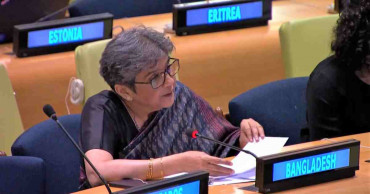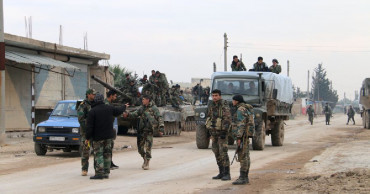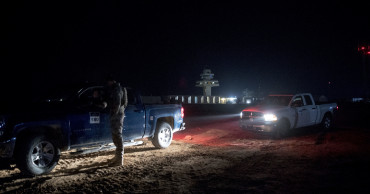UN envoy
Rohingya Crisis: UN envoy seeks renewed int'l attention, equitable burden-sharing by other countries
United Nations Special Envoy of the Secretary-General on Myanmar Noeleen Heyzer has said it is critical that the international community continues to seek comprehensive, durable and inclusive solutions to the Rohingya crisis.
“We cannot let this become a forgotten crisis,” said Special Envoy Heyzer on her four-day mission to Bangladesh.
On the five-year mark of the forced mass displacement of Rohingya from Myanmar’s Rakhine State, Bangladesh continues to show “great generosity and leadership” in hosting refugees, which requires renewed international attention and equitable burden-sharing by countries in the region and beyond, she said on Thursday.
In their productive discussions, the Special Envoy thanked Prime Minister Sheikh Hasina for her leadership and expressed the United Nations’ deep appreciation to the people and government of Bangladesh for their immense contribution.
“I will continue to advocate for greater leadership of countries in the region in supporting Bangladesh and leveraging their influence with Myanmar to create conducive conditions for the voluntary, safe and dignified return of refugees,” she said.
She also highlighted Bangladesh’s pivotal role in working with ASEAN.
“The generosity of Bangladesh and host communities towards Rohingya refugees in their time of need conveys a critical need for greater international and regional commitment to burden share and ensure that the Rohingya do not become forgotten,” Special Envoy Heyzer said.
She highlighted the major pressures on Bangladesh as host of one of the largest refugee populations in the world, which has been exacerbated by the COVID-19 pandemic and climate change.
About 1 million Rohingya refugees are still living in camps in Bangladesh, with tens of thousands more across the region, and over 140,000 internally displaced persons remaining confined in camps in Rakhine.
Driven by desperate hardship conditions, Rohingya people continue to undertake perilous land and sea journeys that expose them to criminal exploitation including human trafficking and gender-based violence.
The Special Envoy emphasized that it was ultimately Myanmar’s responsibility to establish conducive conditions for the voluntary, safe, dignified and sustainable return to Myanmar of all refugees and forcibly displaced persons.
The rights and security of the Rohingya people must be guaranteed and embedded in Myanmar-led solutions towards a peaceful, democratic and inclusive future guided by the recommendations of the Advisory Commission on Rakhine State.
In the context of grave human right violations and unmet protection needs in Myanmar, finding solutions to this crisis and addressing needs and human rights of Rohingya in Rakhine State must include the meaningful participation of those affected, especially Rohingya refugees.
During her visit to the refugee camps in Bangladesh, Special Envoy Heyzer witnessed first-hand the hard work of United Nations agencies among many actors, including civil society organisations, local NGOs and INGOs that provided critical assistance.
“In this operationally challenging environment, I saw Rohingya resilience and hope, innovative and empowering activities carried out by UN agencies and partners, as well as Bangladeshi authorities’ leadership, which all come together while the refugees remain in Bangladesh and waiting for lasting solutions to their plight,” she said.
Read: Will continue to pursue long-term solution to Rohingya crisis: Foreign Missions
3 years ago
UN envoy travels to strife-torn Myanmar for the first time
The U.N. special envoy for Myanmar traveled to the Southeast Asian nation Monday for the first time since she was appointed to the post last October.
The trip by Nellen Heyzer followed the U.N. Security Council’s latest call for an immediate end to all forms of violence and unimpeded humanitarian access in the strife-torn country.
Heyzer “will focus on addressing the deteriorating situation and immediate concerns as well as other priority areas of her mandate,” U.N. spokesman Stephane Dujarric said.
Also read: ASEAN special envoy to Myanmar warns on further executions
He gave no details on whether Heyzer would meet with Myanmar’s military rulers or the country’s imprisoned former leader, Aung San Suu Kyi, a longtime U.N. demand. Suu Kyi was convicted earlier Monday on more corruption charges, adding six years to her earlier 11-year prison sentence.
Heyzer’s visit “follows her extensive consultations with actors from across the political spectrum, civil society as well as communities affected by the ongoing conflict,” Dujarric said.
Earlier this month, Cambodian Foreign Minister Prak Sokhonn, special envoy to Myanmar for the 10-member Association of Southeast Asian Nations, said efforts by Myanmar’s neighbors to help restore peace and normalcy to the strife-torn nation were hindered by the country’s recent execution of four political activists.
He warned that further executions would force the regional group to reconsider how it engages with fellow member Myanmar.
In February 2021, Myanmar’s army ousted Suu Kyi’s elected government and then violently cracked down on widespread protests against its actions. After security forces unleashed lethal force on peaceful demonstrators, some opponents of military rule took up arms.
Also read: Rohingya Repatriation: Momen urges Western leaders to impose economic sanctions on Myanmar
Myanmar’s military rulers agreed to a five-point ASEAN plan in April 2021 to restore peace and stability to the country, which includes an immediate halt to violence and a dialogue among all parties. But the country’s military has made little effort to implement the plan, and Myanmar has slipped into a situation that some U.N. experts have characterized as a civil war.
Heyzer, a women’s rights activist from Singapore, headed UNIFEM, a U.N. development organization that focuses on promoting women’s economic advancement, in 1994-2007. She was the first woman to serve as executive secretary of the U.N. Economic and Social Commission for Asia and the Pacific, in 2007-2014.
3 years ago
UN envoy on Myanmar urged to work towards early repatriation of Rohingyas
Bangladesh has called upon the Special Envoy of the UN Secretary General to Myanmar to work towards an early implementation of the bilateral return arrangements for the Rohingyas
"The most durable solution to the Rohingya crisis lies in their safe, sustainable and dignified return to Myanmar," said Ambassador Rabab Fatima.
She urged the UN to scale up its programmes in Rakhine State to support the Rohingyas on their return.
Ambassador Fatima was addressing the General Assembly on Monday following the briefing by Dr. NoeleenHeyzer, the Special Envoy of the Secretary General on Myanmar.
“Five years have passed since the Rohingyas fled home in one of the largest exoduses in recent history. The promise of safe return remains unfulfilled. Not a single Rohingya has been able to return home. 1.2 million of them remain in a state of uncertainty in Bangladesh. Those remaining in Myanmar are either languishing in IDP camps or under constant threat of forced displacement and insecurity,” said Ambassador Fatima.
Read: Aspiration of Rohingyas will never be forgotten: UN special envoy
The Ambassador called upon the UN, especially the Security Council, to respond with urgency to the recurrent and protracted Rohingya crisis including by addressing the root causes of the crisis.
Referring to the efforts of Bangladesh in providing food, shelter, education, health care and protection to the Rohingyas, she called upon the international community to focus on creating the right conditions in Myanmar.
“Efforts on our side alone will not bring about any lasting solution to the problem. What is needed are actions and programmes in Myanmar, to create the conditions conducive for the return of this population, in dignity, to their homes. And that is the most desired durable solution and the aspiration of the Rohingyas themselves,” she added.
In this regard, she also stressed the importance of ensuring accountability for all violations and abuses in Myanmar and called upon the Security Council to monitor compliance of the Provisional Measures issued by the International Court of Justice in the case initiated by the Gambia on behalf of the OIC.
“My government is doing everything in its power to ensure justice to the Rohingya victims. We are providing full support to the International Criminal Court (ICC), and to the Independent Investigative Mechanism on Myanmar (IIMM) in their efforts.”
Ambassador Fatima urged all countries, especially the regional countries, to provide access and cooperation to all the ongoing accountability mechanisms to ensure justice to the Rohingya Muslims; and prevent future recurrence.
Read: Rohingya crisis: International community must enhance support to Bangladesh – India at UN
The Ambassador expressed appreciation to ASEAN for its efforts to find a resolution to the crisis in Myanmar including by early and full implementation of the five-point consensus concluded between the ASEAN and the Myanmar authorities. She called upon the Special Envoy to continue her engagement with the ASEAN member states, and other countries in the region, in securing a sustained political solution to the protracted Rohingya crisis.
The Special Envoy in her briefing expressed concerns at the current situation in Myanmar, which continues to remain volatile with grave impacts on the civilians including the Rohingya Muslims.
While acknowledging the generosity of the Government of Bangladesh, she reminded the international community of its responsibility towards the Rohingyas.
She shared her future work plan in Myanmar which represents a multipronged approach involving the peace, development and humanitarian actors and engagements at both vertical and horizontal level.
Following the briefing, the member States delivered remarks, in which they expressed their full support to the efforts of the Special Envoy as well as the complementary role of the ASEAN.
The member States commended the exemplary humanitarian leadership of the Government of Bangladesh and expressed their commitment to support Bangladesh in its efforts to forge a lasting solution to the Rohingya crisis.
3 years ago
UN envoy: Sudan could face economic and security collapse
The U.N. envoy for Sudan warned Monday the east African nation is heading for “an economic and security collapse” unless it addresses the political paralysis following October’s military coup and moves toward resuming a civilian-led transition.
Volker Perthes told the U.N. Security Council that the military’s “violent repression” of protests against the coup is continuing and the absence of a political agreement on returning to a transitional path has already led to a deteriorating economic, humanitarian and security situation in the country.
The coup upended Sudan’s democratic transition after a popular uprising forced the military to remove autocratic President Omar al-Bashir in April 2019.
Also read: UN chief wants Ukraine humanitarian cease-fire
Near-daily street protests demanding a return to civilian rule have been met by a crackdown on protesters that has killed 80 people, mostly young men, and injured over 2,600 others, according to a Sudanese medical group. Western governments and world financial institutions suspended their assistance to Sudan in order to pressure the generals to return to civilian-led government.
Perthes said the United Nations, the African Union and the eight-nation east African regional group called the Intergovernmental Authority in Development have agreed to join efforts to facilitate Sudanese-led political talks.
The aim, he said, is a “return to constitutional order and (a) transitional path, with an empowered civilian-led government to steer the country through the transitional period and address the critical priorities.”
To give these talks a chance of succeeding, he said, “favorable conditions must be created” including an end to violence, ensuring the right to demonstrate peacefully, the release of political detainees, and “a firm commitment” to phase out the military’s current state of emergency in the country.
He said women demonstrators have been subjected to violence and intimidation by members of the security forces and 16 women have reportedly been raped during protests in the capital of Khartoum as of March 22, though the figure could be higher due to under-reporting.
Also read: UN finds link between widening inequalities and vaccine access
Perthes said that over the last two weeks, the three organizations have been working on a common approach and consulting key Sudanese parties. He said many of them “have emphasized the urgency of the situation and the need for a speedy yet sound resolution” a view he shares.
“We expect to start an intensive phase of talks in the next couple of weeks, fully recognizing that this will be during the (Muslim) holy month of Ramadan,” Perthes said. “We anticipate that the stakeholders will participate in the month’s spirit of peace and forgiveness.”
The U.N. envoy said that “the stakes are high” and the aspirations of the Sudanese people “for a prosperous, civilian-led, democratic future are at risk.”
“Unless the current trajectory is corrected, the country will head towards an economic and security collapse, and significant humanitarian suffering,” he said.
There have been disturbing reports of increased tensions among Sudan's different security forces, Perthes added. This has sparked concerns in some quarters “that if a political solution is not found, Sudan could descend into conflict and divisions as seen in Libya, Yemen or elsewhere, in a region already beset by instability,” he said.
Perthes also warned that the combination of conflict, economic crisis and poor harvests “will likely double the number of people facing acute hunger in Sudan to 18 million people by September 2022.”
In the absence of a political solution, he said, crime and lawlessness are rising and intercommunal conflicts in the vast western Darfur region have intensified, with farmers forced off their land by violent attacks, villages burned, and homes looted.
3 years ago
UN envoy blames Syria for failure of constitution talks
The U.N. special envoy for Syria said Wednesday the Syrian government’s refusal to negotiate on revisions to the country’s constitution is a key reason for the failure of talks last week that left the road map to peace in the conflict-torn country in question..
Geir Pedersen expressed his disappointment to the U.N. Security Council, saying the parties also failed to agree to meet again before the end of the year. But he said he will continue to engage with all “to address the challenges that have arisen,” saying it is urgent to produce results.
Pedersen said the government delegation presented a proposed constitutional text on Syria’s sovereignty, independence and territorial integrity on Oct. 18, representatives of the exiled opposition presented a text on the armed forces, security and intelligence agencies on Oct. 19, while civil society groups submitted a section on the rule of law on Oct. 20. The government submitted a second text on terrorism and extremism on Oct. 21, he said.
Read:US airstrikes target Iran-backed militias in Syria, Iraq
Pedersen said the government and opposition co-chairs were unable to agree on how discussions should progress further at a plenary meeting Oct. 22, but they did agree that the parties, which include civil society representatives, could present further material.
“In that meeting, the delegation nominated by the government stated that it had no revisions to present of its draft constitutional texts and that it did not see any common ground,” the U.N. envoy said.
He said the opposition presented proposed amendments to all the proposals to try to build common ground, and some civil society representatives also presented revised versions.
The end result, Pedersen said, is that the 45-member drafting committee was “not able to move from submitting and discussing initial draft constitutional texts to developing a productive textual drafting process.”
Despite the failure, Pedersen said he remains convinced “that progress on the constitutional committee could, if done the right way, help to build some trust and confidence.”
“But let me stress that this requires real determination and the political will to try to build some common ground,” he said.
The talks last week followed a nine-month hiatus in the U.N.-led meetings of the Syrian constitutional committee.
Syria’s 10-year conflict has killed between 350,000 and 450,000 people and displaced half the country’s pre-war population of 23 million, including more than 5 million refugees mostly in neighboring countries. Even though the fighting has subsided in recent months, there are still pockets controlled by Syrian opposition, where millions of people live.
Pedersen said that while the talks were under way, violence continued, including terrorist attacks, airstrikes and heavy artillery shelling that caused casualties, including dozens of civilians. He said some incidents “also underlined the constant risks of regional escalation” and again called for a nationwide cease-fire.
Read:Syria’s last aid crossing in balance as Biden to meet Putin
The U.N. envoy said more than 12 million Syrians remain displaced, either inside the country or as refugees elsewhere, and the level of poverty is around 90%.
At a Russia-hosted Syrian peace conference in January 2018, an agreement was reached to form a 150-member committee to draft a new constitution, with a smaller 45-member body to do the actual drafting including 15 members each from the government, opposition and civil society. It took until September 2019 for the committee to be formed.
A 2012 U.N. road map to peace in Syria approved by representatives of the United Nations, Arab League, European Union, Turkey and all five permanent Security Council members calls for the drafting of a new constitution and ends with U.N.-supervised elections with all Syrians, including members of the diaspora, eligible to participate. A Security Council resolution adopted in December 2015 unanimously endorsed the road map.
The United States and several Western allies have accused Syrian President Bashar Assad of deliberately stalling and delaying the drafting of a new constitution until after a presidential election in late May to avoid a U.N.-supervised vote, as called for by the Security Council. Assad was re-elected in what the government called a landslide for a fourth seven-year term, but the West and the Syrian opposition called it an illegitimate and sham election.
4 years ago
Protests, tear gas in Myanmar after UN envoy urges action
Security forces in Myanmar again used force Saturday to disperse anti-coup protesters, a day after a U.N. special envoy urged the Security Council to take action to quell junta violence that this past week left more than 50 peaceful demonstrators dead and scores injured.
4 years ago
UN envoy: Haiti's political crisis sends economy tumbling
The political impasse that has paralyzed Haiti is sending its economy deeper into recession, with 4.6 million people needing humanitarian aid — and there is no immediate end in sight, the U.N. envoy for Haiti said Thursday.
6 years ago
Terrorists' presence in Idlib "unacceptable," but all-out military approach will not work: UN envoy
The UN's envoy for Syria on Thursday said terrorists' presence and influence in Syria's northwestern province of Idlib is unacceptable, but a continued all-out military approach will not solve this problem.
6 years ago
UN envoy urges all-out effort to turn around deteriorating ocean ecosystem
The international community should make every effort to turn around the deteriorating ocean ecosystem, Peter Thomson, United Nations secretary-general's special envoy for the ocean, said on Wednesday.
6 years ago
UN envoy: Terrorist attacks surging in Sahel and West Africa
The U.N. envoy for West Africa and the Sahel says the region has experienced "a devastating surge in terrorist attacks against civilian and military targets" in recent months.
6 years ago
.jpg)
.jpg)



.jpg)







